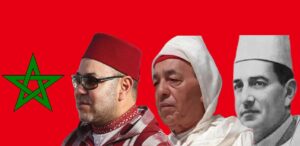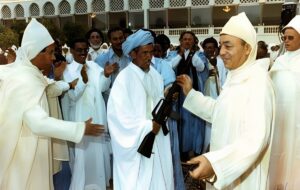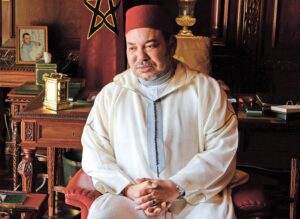King Mohammed VI officially inaugurates the era of Moroccan leadership in Africa!!

The royal speech on the 48th anniversary of the Green March can be considered one of the landmark speeches that scholars and observers will refer to for many years to come. King Mohammed VI intended it to have a "strategic" character, going beyond the celebration of a cherished national anniversary and emphasizing Morocco's constants regarding its territorial integrity. Like the speech "Morocco in its Sahara and the Sahara in its Morocco," this speech will remain a reference for those seeking to understand the major strategic directions of Moroccan diplomacy, and the official inauguration of what can be considered, from this moment on, "Moroccan leadership on the African continent." Here, we emphasize that this leadership—as the Moroccan monarch was keen to clarify in the speech—is not directed toward our African brothers, but rather with them, through them, and for them, in the face of the forces attempting to take turns exploiting the continent's resources, after decades of plunder by traditional colonial powers, particularly France in West Africa.
And for the speech to reach its goal and its intended audience, King Mohammed VI was keen to preface it by clarifying a clear fact, in a bold message that certainly reached its recipient: “The mobilization of national diplomacy has strengthened Morocco’s position, increased international support for its territorial integrity, and countered the maneuvers of its adversaries, both open and hidden.” Morocco, while monitoring the maneuvers of its exposed opponents, confirms that it is on the lookout for the maneuvers of hidden opponents, who insist on fighting Moroccan interests in every forum, especially in the European continent. And because, as the Arabs say, “The suspicious person almost says, ‘Take me,’” it is a message that is bound to attract the attention of the concerned adversaries, who are exposed by their open hostile behavior, even if they exaggerate in showing affection.
Decisiveness and firmness confirm the solidity of the ground upon which Moroccan diplomacy stands, and the confidence with which Morocco views its future, which finally qualifies it to move beyond its narrow regional environment, mired in internal problems created by its rulers. Hence, it seemed logical, after this confident and reassuring tone, for the royal speech to move on to the message he wishes to deliver to his African brothers, capable of providing conclusive answers to the problems they are struggling with, at the security, political, economic and social levels. These problems are nothing more than overdue bills from the brutal colonialism practiced on the African continent, which plundered its resources and impoverished its peoples, encouraged military coups there, and thus deprived it of political stability, hindering its progress on the path to democracy and good governance. Most importantly, he is still trying to "perpetuate" this situation, knowing that the collapse of his African influence and the deprivation of its natural resources will remove him from the ranks of major powers!!
Morocco's initiative, launched a little over a year ago, to establish a trans-African economic bloc, encompassing all 21 African countries bordering the Atlantic Ocean, with Angola and Namibia awaiting the membership of the group, which will now include about half of the continent's countries. This initiative is the answer to the problems facing the continent, and realizing the royal vision for this bloc will be a locomotive for truly uniting the entire continent in the face of its old and new colonizers.
In this context, Moroccan King Mohammed VI did not fail to send a smart signal to the Sahel countries, which are deprived of access to the Atlantic Ocean. These countries, which are neighbors of the new grouping, were victims of arbitrary border divisions carried out by the colonizers to serve their own interests, at the expense of their future for decades to come. Accordingly, according to the royal vision, Mali, Niger, and Burkina Faso should be included under the umbrella of the new grouping. This can be achieved by providing an Atlantic window for these countries via the nearest ports in the Moroccan Sahara (Dakhla and Laayoune), after ensuring the necessary political and logistical conditions. In response to those who might think this is a difficult project to achieve, it is sufficient to know that the capitals of these three countries are approximately 1,400 kilometers away from the city of Taoudeni in northern Mali, which in turn is 1,200 kilometers away from the port of Dakhla. This is through Mauritanian territory, whose cooperation in this project is crucial to its own interests and those of these countries. These are distances over which Morocco has built international roads in its Sahara that extend farther, and it possesses the experience and capabilities that qualify it to repeat this experience.
Thus, within the context of this strategic vision, we can understand why Morocco embraces and defends the Nigerian-Moroccan gas pipeline, which runs through fifteen African Atlantic countries and will extend its resources to the three Sahel countries (Mali, Niger, and Burkina Faso). In contrast, Algeria's generals, both civilian and military, are struggling to belatedly respond to these strategic moves with empty propaganda initiatives and limited economic projects, driven by a single motive: to antagonize Morocco and implement the agenda of its "hidden" opponents, by attempting to buy favors to undermine its territorial integrity. This endeavor is doomed from the outset, as of the twenty-three countries in the new continental bloc, only South Africa remains hostile to Morocco. The Moroccan initiative has dealt a severe blow to its efforts to lead the continent, with some expected support from Namibia. This, in contrast, is the positive neutrality of Mauritania and Nigeria, which leaves 19 members who do not recognize the Polisario Front or its illusory republic.
In conclusion, Morocco's "hidden" adversaries must submit to the logic of the new reality and acknowledge Morocco's leadership in its regional and continental environment. They must not be content with merely repeating cold words about the "seriousness of the autonomy proposal," which has become a reality that Moroccan diplomacy no longer needs to promote. They must accept the burial of their colonial history and submit to dealing with their former colonies on the basis of "equality." Otherwise, they will face successive blows, both in Morocco and Africa, and their exit from their favorite continent will be "resonant"!!





